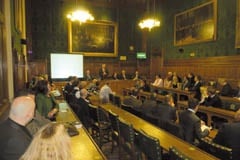MAB debates issue of councils competing with local businesses at the House of Commons
North East Lincolnshire Council, which is leading the way in local authorities selling headstones to the bereaved and is now intending also to offer funerals and flowers, has been given £100,000 by the Government to share its experiences with other councils to encourage them to do the same.
It is the growing threat of competition from local authorities that led to the Memorial Awareness Board (MAB) organising a debate on the subject in a committee room of the House of Commons in March. The motion put was: “This House believes that Local Authorities should not compete commercially against their council tax and rate payers.”
Rob Critchley, Director of memorial masons S Critchley & Sons and materials suppliers The Blast Shop in Manchester forcefully presented the motion while Professor Douglas Davies from the University of Durham spoke against it.
Mike Dewar, Director of One, the agency that heads the Memorial Awareness Board (MAB) campaign that fights for stone memorialisation, said he had asked 18 councils to speak against the motion and all had refused to do so.
As councils face continuing cuts in the money they receive from central government, the attraction of raising money in other ways is growing.
Some councils are using their refuse collectors to deliver leaflets advertising the council’s MoT vehicle testing service and at least four have established housing and development operations that enable them to borrow money they would not otherwise be able to access to build houses.
This commercialisation by local authorities is made possible by the 2011 Localism Act that came into force in April 2013.
Councils have tried to sell memorials for many years, but have always backed down in the face of a stance letter sent to them by the National Association of Memorial Masons (NAMM).
If councils offer a ‘service’, such as memorials, funerals or MoTs, they are supposed to do so at cost price, although just what can be included in that cost is debateable. A Lincolnshire memorial mason at the House of Commons debate told NSS the NE Lincolnshire Council has increased the price of a cremation by 82% in the past three years, interment fees by 61% and the purchase of a grave plot by 140%. She accused the council of “unfair competition” and “preying on the bereaved”.
And, as Rob Critchley said in presenting the motion at the House of Commons, councils are not introducing and promoting these ‘services’ to benefit residents, although they are presented in that way, but “because they are under immense financial pressure”.
And the competition is unfair, he said, because councils have access to facilities paid for by local taxes – including the business rates – and information that is not available to local commercial companies – not least, in the case of memorials, early notification of a bereavement.
Many of the memorial masons who attended the debate in the House of Commons said they had written to their MPs complaining about the risk of unfair competition resulting from the Localism Act. They all seemed to have received a standard response from Kris Hopkins, Minister for Local Government at the Department for Communities & Local Government, which did not address the concerns but simply restated what the Act permits councils to do.
It was suggested by a council representative at the debate that the masons could approach the ombudsman. Some said they had and had been told to seek to resolve the issue with the council.
Rob Critchley concluded his support of the motion by saying there are three reasons why local authorities should not compete commercially against their council tax and ratepayers: “It’s short-sighted; it’s anti-competitive; and, at the end of the day, it’s immoral.”
Opposing the motion, Professor Davies said the loss of the small number of memorial masonry business ratepayers that exist was a small price to pay for the benefits to the majority of ratepayers.

